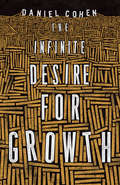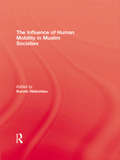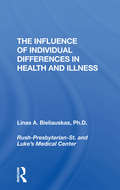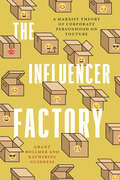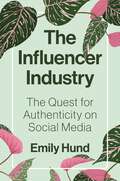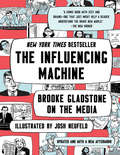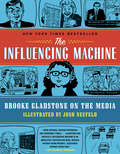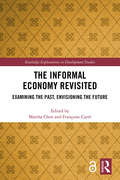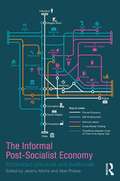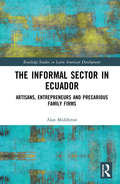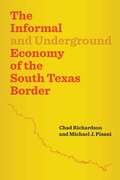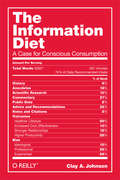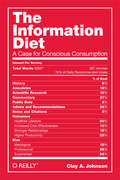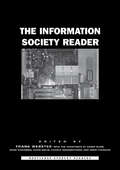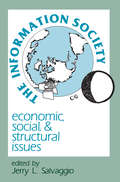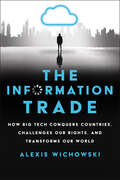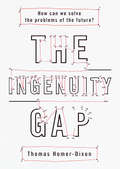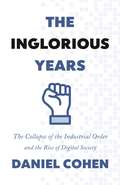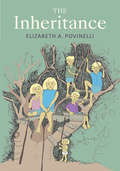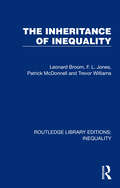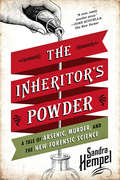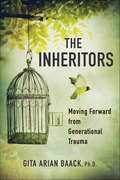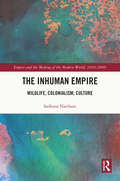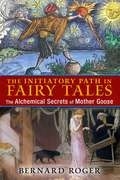- Table View
- List View
The Infinite Desire for Growth
by Daniel Cohen Jane ToddWhy society’s expectation of economic growth is no longer realisticEconomic growth--and the hope of better things to come—is the religion of the modern world. Yet its prospects have become bleak, with crashes following booms in an endless cycle. In the United States, eighty percent of the population has seen no increase in purchasing power over the last thirty years and the situation is not much better elsewhere. The Infinite Desire for Growth spotlights the obsession with wanting more, and the global tensions that have arisen as a result. Amid finite resources, increasing populations, environmental degradation, and political unrest, the quest for new social and individual goals has never been so critical.Leading economist Daniel Cohen provides a whirlwind tour of the history of economic growth, from the early days of civilization to modern times, underscoring what is so unsettling today. The new digital economy is establishing a "zero-cost" production model, inexpensive software is taking over basic tasks, and years of exploiting the natural world have begun to backfire with deadly consequences. Working hard no longer guarantees social inclusion or income. Drawing on economics, anthropology, and psychology, and thinkers ranging from Rousseau to Keynes and Easterlin, Cohen examines how a future less dependent on material gain might be considered and, how, in a culture of competition, individual desires might be better attuned to the greater needs of society.At a time when wanting what we haven't got has become an obsession, The Infinite Desire for Growth explores the ways we might reinvent, for the twenty-first century, the old ideal of social progress.
The Influence Of Human Mobility In Muslim Societies
by Kuroki HidemitsuFirst Published in 2003. This volume explores various aspects of human mobility-both spatial and social-in Muslim societies from the earliest Islamic period to the present times. In general, a high mobility among Muslims has been observed throughout their history, to say nothing of the fact that the pilgrimage to Mecca is one of the five religious duties, or that many Muslim travelers such as Ibn Battuta moved over vast areas. However, the social and political impact of their movement, voluntary or forced, has rarely been analyzed in terms of a multi-disciplinary approach. Researchers specializing in history, anthropology, sociology, psychology and politics from eight countries have contributed their insights on both Muslim and non-Muslim mobility in this multi-faceted volume, which will shed new light on the meaning of mobility and the movement of human beings in the even more globalized world of today.
The Influence Of Individual Differences In Health And Illness
by Linas A BieliauskasThe notion of individual differences in health and illness stems from the unique organization of behavior that profoundly affects how each individual maintains health, expresses and experiences symptoms of illness, and reacts to efforts at treatment. It is difficult to fully understand the interaction between personality and physical wellbeing beca
The Influencer Factory: A Marxist Theory of Corporate Personhood on YouTube
by Grant Bollmer Katherine GuinnessInfluencers are more than social media personalities who attract attention for brands, argue Grant Bollmer and Katherine Guinness. They are figures of a new transformation in capitalism, in which the logic of the self is indistinguishable from the logic of the corporation. Influencers are emblematic of what Bollmer and Guinness call the "Corpocene": a moment in capitalism in which individuals achieve the status of living, breathing, talking corporations. Behind the veneer of leisure and indulgence, most influencers are laboring daily, usually for pittance wages, to manufacture a commodity called "the self"—a raw material for brands to use—with the dream of becoming corporations in human form by owning and investing in the products they sell. Refuting the theory that digital labor and economies are immaterial, Bollmer and Guinness search influencer content for evidence of the material infrastructure of capitalism. Each chapter looks to what literally appears in the backgrounds of videos and images: the houses, cars, warehouses, and spaces of the market that point back to the manufacturing and circulation of consumer goods. Demonstrating the material reality of producing the self as a commodity, The Influencer Factory makes a crucial contribution to our understanding of contemporary economic life.
The Influencer Industry: The Quest for Authenticity on Social Media
by Emily HundA critical history of the social media influencer&’s rise to global prominenceBefore there were Instagram likes, Twitter hashtags, or TikTok trends, there were bloggers who seemed to have the passion and authenticity that traditional media lacked. The Influencer Industry tells the story of how early digital creators scrambling for work amid the Great Recession gave rise to the multibillion-dollar industry that has fundamentally reshaped culture, the flow of information, and how we relate to ourselves and each other.Drawing on dozens of in-depth interviews with leading social media influencers, brand executives, marketers, talent managers, trend forecasters, and others, Emily Hund shows how early industry participants focused on creating and monetizing digital personal brands as a means of exerting control over their professional destinies in a time of acute economic uncertainty. Over time, their activities coalesced into an industry whose impact has reached far beyond the dreams of its progenitors—and beyond their control. Hund illustrates how the methods they developed for creating, monetizing, and marketing social media content have permeated our lives and untangles the unforeseen cultural and economic costs.The Influencer Industry reveals how, in an increasingly fractured and profit-driven communications environment, the people we think of as &“real&” are merely those who have learned to exploit the industry&’s ever-shifting constructions of authenticity.
The Influencing Machine (Updated Edition): Brooke Gladstone On The Media
by Josh Neufeld Brooke GladstoneNew York Times Bestseller With a New Afterword “A comic book with zest and brains—one that just might help a reader understand the brave new world.” —The New Yorker A million listeners trust NPR’s Brooke Gladstone to guide them through the complexities of the modern media. Bursting onto the page in vivid comics by acclaimed artist Josh Neufeld, this brilliant radio personality guides us through two millennia of media history, debunking the notion that “The Media” is an external force beyond our control and equipping us to be savvy consumers and shapers of the news. An invaluable introduction to how the media works from one of the acknowledged masters of the industry, this tenth anniversary edition brings the story up to date, with new illustrations and an afterword that offers a deep examination of the rise of social media and the public’s responsibility in a time of division and disinformation.
The Influencing Machine: Brooke Gladstone on the Media
by Josh Neufeld Brooke GladstoneA million listeners trust NPR's Brooke Gladstone to guide them through the complexities of the modern media. Bursting onto the page in vivid comics by acclaimed artist Josh Neufeld, this brilliant radio personality guides us through two millennia of media history, debunking the notion that "The Media" is an external force beyond our control and equipping us to be savvy consumers and shapers of the news. Owing to the graphic format, this book is readable only on larger screens and devices.
The Informal Economy Revisited: Examining the Past, Envisioning the Future (Routledge Explorations in Development Studies)
by Martha Chen Françoise CarréThis landmark volume brings together leading scholars in the field to investigate recent conceptual shifts, research findings and policy debates on the informal economy as well as future challenges and directions for research and policy. Well over half of the global workforce and the vast majority of the workforce in developing countries work in the informal economy, and in countries around the world new forms of informal employment are emerging. Yet the informal workforce is not well understood, remains undervalued and is widely stigmatised. Contributors to the volume bridge a range of disciplinary perspectives including anthropology, development economics, law, political science, social policy, sociology, statistics, urban planning and design. The Informal Economy Revisited also focuses on specific groups of informal workers, including home-based workers, street vendors and waste pickers, to provide a grounded insight into disciplinary debates. Ultimately, the book calls for a paradigm shift in how the informal economy is perceived to reflect the realities of informal work in the Global South, as well as the informal practices of the state and capital, not just labour. The Informal Economy Revisited is the culmination of 20 years of pioneering work by WIEGO (Women in Informal Employment: Globalizing and Organizing), a global network of researchers, development practitioners and organisations of informal workers in 90 countries. Researchers, practitioners, policy-makers and advocates will all find this book an invaluable guide to the significance and complexities of the informal economy, and its role in today’s globalised economy.
The Informal Post-Socialist Economy: Embedded Practices and livelihoods (Routledge Contemporary Russia and Eastern Europe Series)
by Jeremy Morris and Abel PoleseFrom smugglers to entrepreneurs, blue-collar workers and taxi drivers, this book deals with the multitude of characters engaged in informal economic practices in the former socialist regions. Going beyond a conception of informality as opposed to the formal sector, its authors demonstrate the fluid nature of informal transactions straddling the crossroads between illegal, illicit, socially acceptable and symbolically meaningful practices. Their argument is informed by a wide range of case studies, from Central Europe to the Baltics and Central Asia, each of which is constructed around a single informant. Each chapter narrates the story of a composite person or household that was carefully selected or constructed by an author with long-standing ethnographic research experience in the given field site. Wide in geographical, empirical and theoretical scope, the book uses ethnographic narrative accounts of everyday life to make links between ‘ordinary’ meanings of informality. Challenging reductively economistic perspectives on cross-border trading, undeclared work and other informal activities, the authors illustrate the wide variety of interpretive meanings that people ascribe to such practices. Alongside ‘getting by’ and ‘getting ahead’ in recently marketised societies, these meanings relate to sociality, kinship-ties and solidarity, along with more surprising ‘political’ and moral reasonings.
The Informal Sector in Ecuador: Artisans, Entrepreneurs and Precarious Family Firms (Routledge Studies in Latin American Development)
by Alan MiddletonThis book looks back over the last forty years of change and development in Ecuador, showing how macro level changes have impacted families and workplaces on the local level. Traditionally a dependent economy reliant on agricultural exports, the impact of neoliberalism and new sources of income from oil have transformed the informal and artisanal sectors in Ecuador. Exploring these dynamics using a combination of micro and macro analyses, this book demonstrates how the social relations of the sector are connected to the wider social, economic and political systems in which they operate. The book dives into the links between micro-production and the wider economy, including the relationships between different types of artisanal enterprises and their customers, their connections to the private sector and the state, the importance of social networks and social capital and the relevance of finance capital in microenterprise development. Overall, the analysis investigates how artisans, entrepreneurs and family-based enterprises seek to protect their interests when faced with neoliberal policies and the impacts of globalisation. This remarkable longitudinal study will be of considerable interest to researchers of development studies, economics, sociology, anthropology, geography and Latin American Studies.
The Informal and Underground Economy of the South Texas Border
by Chad Richardson Michael J. PisaniMuch has been debated about the presence of undocumented workers along the South Texas border, but these debates often overlook the more complete dimension: the region’s longstanding, undocumented economies as a whole. Borderlands commerce that evades government scrutiny can be categorized into informal economies (the unreported exchange of legal goods and services) or underground economies (criminal economic activities that, obviously, occur without government oversight). Examining long-term study, observation, and participation in the border region, with the assistance of hundreds of locally embedded informants, The Informal and Underground Economy of the South Texas Border presents unique insights into the causes and ramifications of these economic channels. The third volume in UT–Pan American’s Borderlife Project, this eye-opening investigation draws on vivid ethnographic interviews, bolstered by decades of supplemental data, to reveal a culture where divided loyalties, paired with a lack of access to protection under the law and other forms of state-sponsored recourse, have given rise to social spectra that often defy stereotypes. A cornerstone of the authors’ findings is that these economic activities increase when citizens perceive the state’s intervention as illegitimate, whether in the form of fees, taxes, or regulation. From living conditions in the impoverished colonias to President Felipe Calderón’s futile attempts to eradicate police corruption in Mexico, this book is a riveting portrait of benefit versus risk in the wake of a “no-man’s-land” legacy.
The Information Diet
by Clay A. JohnsonThe modern human animal spends upwards of 11 hours out of every 24 in a state of constant consumption. Not eating, but gorging on information ceaselessly spewed from the screens and speakers we hold dear. Just as we have grown morbidly obese on sugar, fat, and flour--so, too, have we become gluttons for texts, instant messages, emails, RSS feeds, downloads, videos, status updates, and tweets. We're all battling a storm of distractions, buffeted with notifications and tempted by tasty tidbits of information. And just as too much junk food can lead to obesity, too much junk information can lead to cluelessness. The Information Diet shows you how to thrive in this information glut--what to look for, what to avoid, and how to be selective. In the process, author Clay Johnson explains the role information has played throughout history, and why following his prescribed diet is essential for everyone who strives to be smart, productive, and sane. In The Information Diet, you will: Discover why eminent scholars are worried about our state of attention and general intelligence Examine how today's media--Big Info--give us exactly what we want: content that confirms our beliefs Learn to take steps to develop data literacy, attention fitness, and a healthy sense of humor Become engaged in the economics of information by learning how to reward good information providers Just like a normal, healthy food diet, The Information Diet is not about consuming less--it's about finding a healthy balance that works for you
The Information Diet: A Case for Conscious Comsumption
by Clay A. JohnsonThis is a softcover version of the title released in 2011; there is no new material.The modern human animal spends upwards of 11 hours out of every 24 in a state of constant consumption. Not eating, but gorging on information ceaselessly spewed from the screens and speakers we hold dear. Just as we have grown morbidly obese on sugar, fat, and flour—so, too, have we become gluttons for texts, instant messages, emails, RSS feeds, downloads, videos, status updates, and tweets.We're all battling a storm of distractions, buffeted with notifications and tempted by tasty tidbits of information. And just as too much junk food can lead to obesity, too much junk information can lead to cluelessness. The Information Diet shows you how to thrive in this information glut—what to look for, what to avoid, and how to be selective. In the process, author Clay Johnson explains the role information has played throughout history, and why following his prescribed diet is essential for everyone who strives to be smart, productive, and sane.In The Information Diet, you will:Discover why eminent scholars are worried about our state of attention and general intelligenceExamine how today’s media—Big Info—give us exactly what we want: content that confirms our beliefsLearn to take steps to develop data literacy, attention fitness, and a healthy sense of humorBecome engaged in the economics of information by learning how to reward good information providersJust like a normal, healthy food diet, The Information Diet is not about consuming less—it’s about finding a healthy balance that works for you
The Information Diet: A Case for Conscious Consumption
by Clay A. JohnsonThe modern human animal spends upwards of 11 hours out of every 24 in a state of constant consumption. Not eating, but gorging on information ceaselessly spewed from the screens and speakers we hold dear. Just as we have grown morbidly obese on sugar, fat, and flour—so, too, have we become gluttons for texts, instant messages, emails, RSS feeds, downloads, videos, status updates, and tweets.We're all battling a storm of distractions, buffeted with notifications and tempted by tasty tidbits of information. And just as too much junk food can lead to obesity, too much junk information can lead to cluelessness. The Information Diet shows you how to thrive in this information glut—what to look for, what to avoid, and how to be selective. In the process, author Clay Johnson explains the role information has played throughout history, and why following his prescribed diet is essential for everyone who strives to be smart, productive, and sane.In The Information Diet, you will:Discover why eminent scholars are worried about our state of attention and general intelligenceExamine how today’s media—Big Info—give us exactly what we want: content that confirms our beliefsLearn to take steps to develop data literacy, attention fitness, and a healthy sense of humorBecome engaged in the economics of information by learning how to reward good information providersJust like a normal, healthy food diet, The Information Diet is not about consuming less—it’s about finding a healthy balance that works for you
The Information Society Reader (Routledge Student Readers)
by Frank WebsterThere has been much debate over the idea of 'the information society'. Some thinkers have argued that information is becoming the key ordering principle in society, whereas others suggest that the rise of information has been overstated. Whatever the case, it cannot be denied that 'informization' has produced vast changes in advanced societies. The Information Society Reader pulls together the main contributions to this debate from some of the key figures in the field. Major topics addressed include:* post-industrialism* surveillance* transformations* the network society* democracy* digital divisions* virtual relations.With a comprehensive introduction from Frank Webster, selections from Manuel Castells, Anthony Giddens, Michel Foucault and Christopher Lasch amongst others, and section introductions contextualising the readings, this book will be an invaluable resource for students and academics studying contemporary society and all things cyber.
The Information Society: Economic, Social, and Structural Issues (Routledge Communication Series)
by Jerry L. SalvaggioFirst Published in 1989. Routledge is an imprint of Taylor & Francis, an informa company.
The Information Trade: How Big Tech Conquers Countries, Challenges Our Rights, and Transforms Our World
by Alexis Wichowski"A timely, compelling, and expertly researched passport to the tech companies that rule today's digital landscape."—Blake Harris, bestselling author of Console Wars and The History of the Future.In this provocative book about our new tech-based reality, political insider and tech expert Alexis Wichowski considers the unchecked rise of tech giants like Facebook, Google, Amazon, Apple, Microsoft, and Tesla—what she calls “net states”— and their unavoidable influence in our lives. Rivaling nation states in power and capital, today’s net states are reaching into our physical world, inserting digital services into our lived environments in ways both unseen and, at times, unknown to us. They are transforming the way the world works, putting our rights up for grabs, from personal privacy to national security. Combining original reporting and insights drawn from more than 100 interviews with technology and government insiders, including Microsoft president Brad Smith, Google CEO Eric Schmidt, the former Federal Trade Commission chair under President Obama, and the managing director of Jigsaw—Google’s Department of Counter-terrorism against extremism and cyber-attacks—The Information Trade explores what happens we give up our personal freedom and individual autonomy in exchange for an easy, plugged-in existence, and shows what we can do to control our relationship with net states before they irreversibly change our future.
The Ingenuity Gap: Can We Solve The Problems Of The Future?
by Thomas Homer-Dixon"The most persuasive forecast of the 21st century I have seen. " -- E. O. Wilson, author ofConsilience: The Unity of Knowledgeand twice winner of a Pulitzer prize “Human beings have been smart enough to turn nature to their ends, generate vast wealth for themselves, and double their average life span. But are they smart enough to solve the problems of the 21st century?” --Thomas Homer-Dixon Can we create ideas fast enough to solve the very problems -- environmental, social, and technological -- we’ve created? Homer-Dixon pinpoints the “ingenuity gap” as the critical problem we face today, and tackles it in a riveting, groundbreaking examination of a world that is rapidly exceeding our intellectual grasp. InThe Ingenuity Gap, Thomas Homer-Dixon, "global guru" (theToronto Star), "genuine academic celebrity" (Saturday Night) and "one of Canada's most talked about and controversial scholars" (Maclean's) asks: is our world becoming too complex, too fast-paced to manage? The challenges facing us -- ranging from international financial crises and global climate change to pandemics of tuberculosis and AIDS- converge, intertwine, and remain largely beyond our ken. Most of suspect the "experts don't really know what's going on; that as a species we've released forces that are neither managed nor manageable. We are fast approaching a time when we may no longer be able to control a world that increasingly exceeds our grasp. This is "the ingenuity gap" -- the term coined by Thomas Homer-Dixon, political scientist and advisor to the White House -- the critical gap between our need for practical, innovative ideas to solve complex problems and our actual supply of those ideas. Through gripping narrative stories and incidents that exemplify his arguments, he takes us on a world tour that begins with a heartstopping description of the tragic crash of United Airlines Flight 232 from Denver to Chicago and includes Las Vegas in its desert, a wilderness beach in British Columbia, and his solitary search for a little girl in Patna, India. He shows how, in our complex world, while poor countries are particularly vulnerable to ingenuity gaps, our own rich countries are not immune, and we are caught dangerously between a soaring requirement for ingenuity and an increasingly uncertain supply. When the gap widens, political disintegration and violent upheaval can result, reaching into our own economies and daily lives in subtle ways. In compelling, lucid, prose, he makes real the problems we face and suggests how we might overcome them -- in our own lives, our thing, our business and our societies. From the Trade Paperback edition.
The Inglorious Years: The Collapse of the Industrial Order and the Rise of Digital Society
by Daniel CohenHow populism is fueled by the demise of the industrial order and the emergence of a new digital society ruled by algorithmsIn the revolutionary excitement of the 1960s, young people around the world called for a radical shift away from the old industrial order, imagining a future of technological liberation and unfettered prosperity. Industrial society did collapse, and a digital economy has risen to take its place, yet many are left feeling marginalized and deprived of the possibility of a better life. The Inglorious Years explores the many ways we have been let down by the rising tide of technology, showing how our new interconnectivity is not fulfilling its promise.In this revelatory book, economist Daniel Cohen describes how today's postindustrial society is transforming us all into sequences of data that can be manipulated by algorithms from anywhere on the planet. As yesterday's assembly line was replaced by working online, the leftist protests of the 1960s have given way to angry protests by the populist right. Cohen demonstrates how the digital economy creates the same mix of promises and disappointments as the old industrial order, and how it revives questions about society that are as relevant to us today as they were to the ancients.Brilliant and provocative, The Inglorious Years discusses what the new digital society holds in store for us, and reveals how can we once again regain control of our lives.
The Inheritance
by Elizabeth A. PovinelliElizabeth A. Povinelli’s inheritance was passed down not through blood or soil but through a framed map of Trentino, Alto Adige—the region where family's ancestral alpine village is found. Far more than a map hanging above the family television, the image featured colors and lines that held in place the memories and values fueling the Povinelli family's fraught relationships with the village and with each other. In her graphic memoir The Inheritance, Povinelli explores the events, traumas, and powers that divide and define our individual and collective pasts and futures. Weaving together stories of her grandparents' flight from their village in the early twentieth century to the fortunes of their knife-grinding business in Buffalo, New York, and her own Catholic childhood in a shrinking Louisiana woodlands of the 1960s and 1970s, Povinelli describes the serial patterns of violence, dislocation, racism and structural inequality that have shaped not only her life but the American story. Plumbing the messy relationships among nationality, ethnicity, kinship, religion, and belonging, The Inheritance takes us into the gulf between the facts of history and the stories we tell ourselves to survive and justify them.
The Inheritance of Inequality (Routledge Library Editions: Inequality #2)
by Trevor Williams Leonard Broom Patrick McDonnell F. L. JonesOriginally published in 1980 at a time when the discipline of sociology was still relatively young in Australia, The Inheritance of Inequality is an important contribution to the study of social mobility in Australia. The book is based on findings from a survey of nearly 5,000 Australians who were interviewed about their family backgrounds and occupational careers. In its scope and sample size, the survey was unique among non-governmental Australian studies. It went beyond the findings of earlier surveys, giving broader understanding of social mobility and stratification. The book sets out the processes by which Australians have found their place in the world of work in the 20th Century. Factors tending to enhance or frustrate attainment are identified and the degree to which Australia is an egalitarian society is assessed.
The Inheritor's Powder: A Tale of Arsenic, Murder, and the New Forensic Science
by Sandra HempelIn the first half of the nineteenth century, an epidemic swept Europe: arsenic poisoning. Available at any corner shop for a few pence, arsenic was so frequently used by potential beneficiaries of wills that it was nicknamed "the inheritor's powder. " But it was difficult to prove that a victim had been poisoned, let alone to identify the contaminated food or drink since arsenic was tasteless. Then came a riveting case. On the morning of Saturday, November 2, 1833, the Bodle household sat down to their morning breakfast. That evening, the local doctor John Butler received an urgent summons: the family and their servants had collapsed and were seriously ill. Three days later, after lingering in agony, wealthy George Bodle died in his bed at his farmhouse in Plumstead, leaving behind several heirs, including a son and grandson--both of whom were not on the best of terms with the family patriarch. The investigation, which gained international attention, brought together a colorful cast of characters: bickering relatives; a drunken, bumbling policeman; and James Marsh, an unknown but brilliant chemist who, assigned the Bodle case, attempted to create a test that could accurately pinpoint the presence of arsenic. In doing so, however, he would cause as many problems as he solved. Were innocent men and women now going to the gallows? And would George Bodle's killer be found?Incisive and wryly entertaining, science writer Sandra Hempel brings to life a gripping story of domestic infighting, wayward police behavior, a slice of Victorian history, stories of poisonings, and an unforgettable foray into the origins of forensic science.
The Inheritors: Moving Forward from Generational Trauma
by Gita Arian BaackOur family legacies, both positive and negative, are passed down from one generation to the next in ways that are not fully understood. This secondary form of trauma, which Gita Baack calls “Inherited Trauma,” has not received adequate attention—a failing that perpetuates cycles of pain, hatred, and violence. In The Inheritors, readers are given the opportunity to reflect on the inherited burdens they carry, as well as the resilience that has given them the power of survival. Through engaging stories and unique concepts, readers will learn new ways to explore the unknowns in their legacies, reflect on questions that are posed at the end of each chapter, and begin to write their own story.
The Inhuman Empire: Wildlife, Colonialism, Culture (Empire and the Making of the Modern World, 1650-2000)
by Sadhana NaithaniThis book is a study of selected texts of British writings on Indian wildlife published between 1860 and 1960.Set in the context of British colonial rule in India, this book also reflects on similar situations across the British Empire and other colonial empires. The destruction of wildlife in the making of empires is a subject not yet fully explored in scholarship. This book aims to speak to global concerns regarding the extinction of several species and shows that the crisis has international roots. The Inhuman Empire breaks new grounds as it juxtaposes colonial narratives to folk narratives. These two types of narratives treat nonhuman animals very differently – folk narrative considers them sentient beings, while colonial narratives see them as ‘game’ and do not care for their sentience. Both types of narratives are further evaluated with reference to the contemporary position of natural sciences regarding animal sentience and of anthropologists and philosophers regarding the relationship between nature and culture. Analyzing colonial accounts of hunting, the author looks at the pain and suffering of nonhuman animals and combines statistics alongside narratives of British writers, Indian populace and nonhuman animals in order to show narratives' reflect and impact reality.This book will be of great value to those interested in Animal Studies, Folkloristics, the history of Colonialism and India.
The Initiatory Path in Fairy Tales: The Alchemical Secrets of Mother Goose
by Bernard RogerHidden within age-old classic stories lie the hermetic teachings of alchemy and Freemasonry • Explains how the stages of the Great Work are encoded in both little known and popular stories such as Cinderella, Snow White, and Little Red Riding Hood • Reveals the connection between Mother Goose and important esoteric symbols of the Western Mystery tradition • Demonstrates the ancient lineage of these stories and how they originated as the trigger to push humanity toward higher levels of consciousness In his Mystery of the Cathedrals, the great alchemist Fulcanelli revealed the teachings of the hermetic art encoded in the sculpture and stained glass of the great cathedrals of Europe. What he did for churches, his disciple Bernard Roger does here for fairy tales. Through exhaustive analysis of the stories collected by the Brothers Grimm, Perrault, and others, Roger demonstrates how hermetic ideas, especially those embodied in alchemy and Freemasonry, can be found in fairy tales, including such popular stories as Cinderella, Snow White, Sleeping Beauty, and Little Red Riding Hood as well as the tales attributed to “Mother Goose.” The goose has long been an important esoteric symbol in the Western Mystery tradition. The stories told under the aegis of Mother Goose carry these symbols and secrets, concealed in what hermetic adepts have long called “the language of the birds.” Drawing upon the original versions of fairy tales, not the sanitized accounts made into children’s movies, the author reveals how the tales illustrate each stage of the Great Work and the alchemical iterations required to achieve them. He shows how the common motif of a hero or heroine sent in search of a rare object by a sovereign before their wishes can be granted is analogous to the Masonic quest for the lost tomb of Hiram or the alchemist’s search for the fire needed to perform the Great Work. He also reveals how the hero is always aided by a green bird, which embodies the hermetic understanding of the seed and the fruit. By unveiling the secret teachings within fairy tales, Roger demonstrates the truly ancient lineage of these initiatory stories and how they originated as the trigger to push humanity toward higher levels of consciousness.
